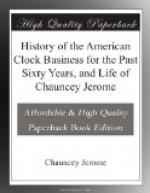little better than so much old iron. Terry knowing
that Barnum was largely interested in real estate
in East Bridgeport, and anxious to have it improved,
thought he could make a good arrangement with him
for building a factory there for the manufacture of
clocks, and did so. Terry had a large quantity
of old clocks in a store in New York—many
of them old-fashioned and unsaleable, and thousands
of these were not worth fifty cents apiece. Terry
and Barnum now proposed forming a joint-stock company,
putting in their old rubbish as stock, and estimating
it, most likely, at four times its value in cash.
They built a factory in East Bridgeport, and made
preparations for manufacturing. Terry knew ten
times as much about the business as Barnum did, and
knowing, also, that the old stock was comparatively
worthless, held back while Barnum was urging him to
push ahead with the manufacturing. Terry made
a great bluster, saying that he was going to hire
men and do a great business, while, unknown to Barnum,
he was trying to sell the stock he held in the company.
They finally cooked up a plan to sell their New York
store and the Bridgeport factory and machinery, if
they could, to the Jerome Manufacturing Company, taking
stock in that company for pay, and—the Jerome
Company stock being issued to the owners of the Terry
& Barnum stock—thus merge the two companies
into one. This transaction was made and closed
without my knowledge, (I being at the time from the
State,) though the “old man” has had to
bear all the blame. As I afterwards found out,
Barnum told my son, the Secretary of the Company,
that Terry & Barnum owed about twenty thousand dollars:
this was the amount Terry had drawn for on the New
York store. They made a written agreement with
the Jerome Manufacturing Company, to this effect;—that
our Company should assume the liabilities of their
old Company, which were stated at twenty thousand dollars,
and Barnum was to endorse to any extent for the Jerome
Company. It afterwards proved that the entire
debts of Terry & Barnum amounted to about seventy-two
thousand dollars, which the Jerome Company were obliged
to assume. The great difference in the real and
supposed amount of their indebtedness and the unsaleable
property turned in as stock were enough to ruin any
company. It is a positive fact that the stock
of the Jerome Company was not worth half as much,
three months after Barnum came into the concern as
it was before that time. Some of the stock-holders
did not like to have Terry own stock, and Barnum to
satisfy them, bought him out, paying him twelve thousand
dollars in cash—he in the end, making a
grand thing out his Ansonia remains. It is well
known that the Jerome Manufacturing Company failed
in the fall of 1855, to the wonder and astonishment
of myself and of every body else. The true causes
of this great failure never have been made public.
I myself did not know them at that time, but have
found them out from time to time since, and I now




